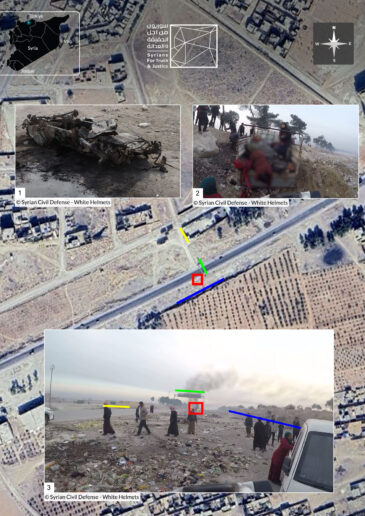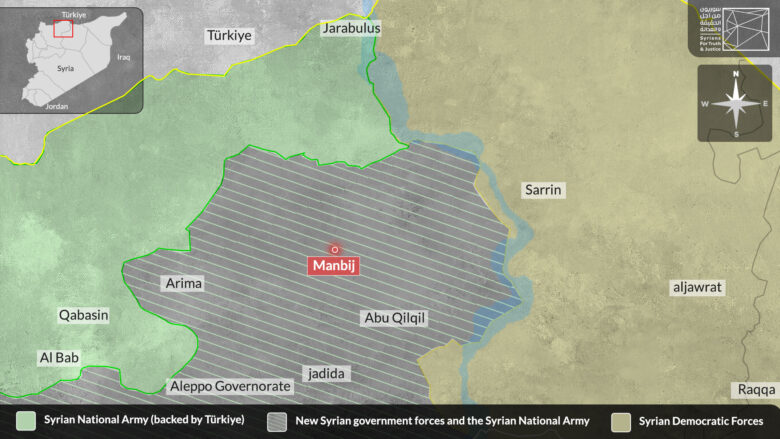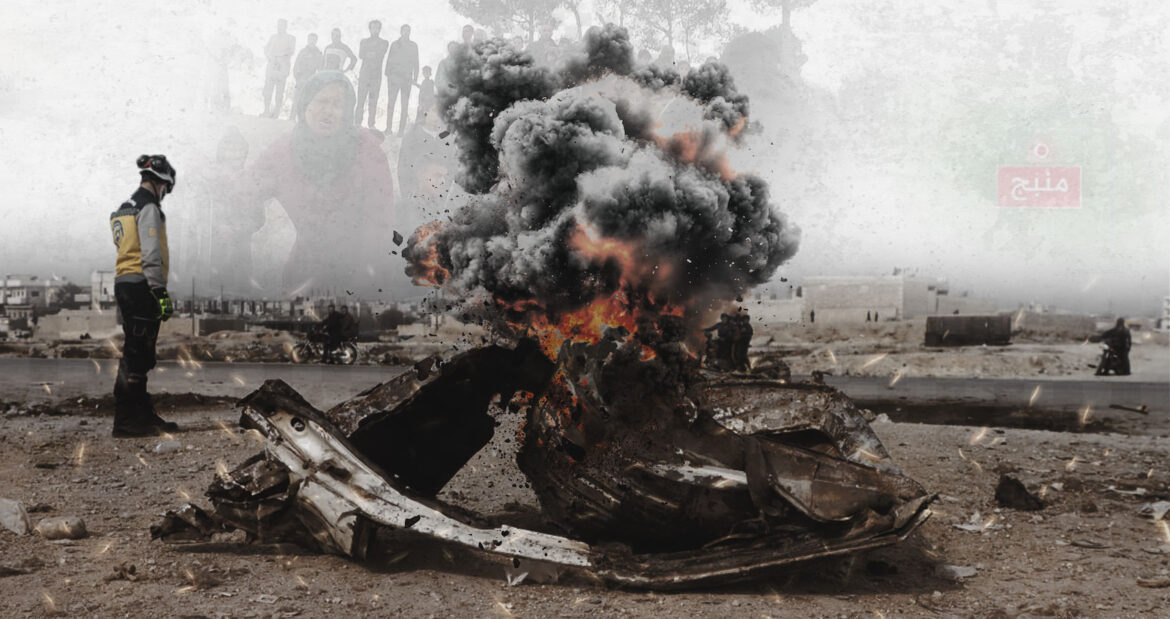“How did this happen? What did we do to deserve such pain? Why must we live in fear and loss? How will I manage without Duaa?”
These were the heart-wrenching questions posed by Khaled Al-Jabal after his daughter Duaa lost her life and her twin sister Israa was seriously injured in a tragic incident. A Suzuki truck bomb exploded as their car passed by, while transporting them and over 30 other female farmers – day laborers – to their workplace in the al-Asaliyah area of Manbij, in the eastern Aleppo countryside, on the morning of 3 February 2025.
The bomb of a car parked on the side of the main highway in Manbij resulted in the deaths of 22 civilians, including 21 women and one man, who was the driver of the pickup truck transporting the female farmers. This information was reported by Dr. Amin al-Mashhad, a doctor at Manbij National Hospital, also known as al-Furat Hospital, where the victims of the incident were treated.
The doctor reported that the hospital received 17 bodies and 16 injured individuals on the day of the incident, with the victim count later increasing due to severe injuries.[1]
The recent explosion was deemed the “deadliest” in a series of similar blasts in Manbij. Seven car bomb explosions have been reported since the city was taken over by factions of the Turkish-backed Syrian National Army (SNA) on 6 December 2024. This takeover was part of Operation Dawn of Freedom, which commenced on 30 November 2024, against the Syrian Democratic Forces (SDF), who had controlled the city since 2016.
During the time the bombings took place, the SNA factions maintained military control over the city, supported by a civil administration. They, along with the Military Police connected to the army, set up checkpoints at night. Meanwhile, the General Security Administration, affiliated with the Syrian Transitional Government, entered the city only during the visit of the Governor of Aleppo on 26 January 2025, and subsequently departed, as reported by the Enab Baladi media website, citing local residents.
In a statement on Telegram, the Syrian Presidency condemned the explosion, calling it a “treacherous terrorist act.” They asserted that they “will not hesitate to pursue and hold accountable those involved in this criminal act.” The identity of the perpetrators for the explosions remains unknown, as accusations are exchanged between the SNA and the SDF. The identities of the perpetrators remain unknown, with accusations being exchanged between the SNA and the SDF who are engaged in ongoing battles for control of the Tishrin Dam, located northeast of Manbij, which has led to civilian casualties, particularly due to Turkish drone attacks on the dam.
On its Facebook page, the SDF condemned the recent bombing and denied any responsibility for it. They stated that “[t]he culture of car bombs, infighting, terrorism, chaos, and sedition is integral to the actions of the mercenary factions affiliated with Türkiye,” specifically referring to the SNA factions. The SDF also asserted that “[t]he bombings are part of a fixed strategy employed by these groups to instill fear in residents and prevent them from protesting the dire conditions in Manbij, which include theft, looting, and sexual violence committed by members of these factions.”
It is important to highlight that Manbij has experienced a rise in human rights violations by members of the SNA since they took over the city. Reports from various human rights organizations and media sources indicate that these violations include summary executions, arbitrary arrests, torture, and the looting of property, which have led to a significant exodus of the local population.
Syrians for Truth and Justice (STJ) reached out to the families of several women who lost their lives in a recent bombing. All of the victims resided in the al-Rasm al-Akhdar camp for internally displaced persons (IDPs), which lacks adequate support and fails to provide its residents with basic necessities.
One of the survivors, Israa al-Jabal, is a 17-year-old girl who witnessed the tragedy alongside her twin sister, Duaa al-Jabal, who was a victim. Israa recounted that the explosion occurred at 6:15 a.m. while she, Duaa, and other female workers were being driven in a car to the farmland for work.[2]
“We were laughing and chatting when the explosion unexpectedly occurred. I remember the deafening sound of the explosion. It felt like I lost consciousness right away. When I woke up, I found myself next to the burning car, engulfed in flames. My clothes were on fire, and my body was covered in blood and body parts. The scene was indescribably terrifying.”
Along with her body still aching from injuries, Israa said,
“The terrifying scenes haunt me every moment. Sometimes, I cannot sleep because of the shock.”
After the explosion, Israa was unable to locate her sister Duaa amidst the destruction and chaos. She took a car to the al-Rasm al-Akhdar camp in Manbij, where her family resides, to tell her father, Khaled al-Jabal, what happened. Khaled testified,[3]
“I was in shock. I left the terrified and panicked Israa and rushed to the explosion site. After hours of searching, we finally arrived, but all I found was a blazing fire and blood-stained ground. I could not find anyone. The area was covered in debris. It was impossible to understand what had happened.”
Khaled said he found Duaa’s lifeless body on a bed at Manbij National Hospital after an extensive search. He mourned,
“What hurts me most is that I cannot achieve justice for my daughter’s death.”
Mohammed al-Mahmoud learned about the explosion from a 14-year-old girl who had survived and quickly rushed to the al-Rasm al-Akhdar camp to inform the victims’ families about what had happened. He immediately hurried to the site of the explosion, which he described as “filled with smoke and fire.”[4]
After a long search, Mohammed found his 34-year-old daughter, Nahoud, at the National Hospital. Sadly, she had died from severe injuries. He said,
“Nahoud was divorced and had a young daughter. She worked on a farm to support both herself and her child, earning just two dollars a day. Despite this, she put in great effort to improve her life and the life of her daughter.”
Jamal Khalif shared a heartbreaking story about his relative, who lost the mother of his four children, Maryam al-Qaddah, 29, in the explosion, as well as his niece, Jawaher A., only 15 years old. Jawaher had been caring for her five siblings, all under the age of 13, after their father was killed in a Russian airstrike that targeted Idlib in 2015, leaving the family devastated. Jamal recounted,[5]
“[Jawaher] used to accompany my relative’s wife to the farmland, where they worked for a daily wage of no more than two dollars. Despite her young age, she was forced to work due to the difficult living conditions they faced. Jawaher took on a motherly role for her sisters, striving to provide for them. Her hard work was essential for their survival. The harsh conditions in the camp and the region as a whole forced her to shoulder a burden beyond her years.”
A military source from the SNA in Manbij has placed responsibility for the recent bombing on the SDF. The source stated,[6]
“That morning, a member of the SDF attempted to bring a small Suzuki car loaded with explosives into the city. However, due to tightened security checkpoints, he was unable to carry out the plan and was forced to abandon the vehicle on the M4 international highway, east of the al-Matahen roundabout. He waited for the right moment to detonate it but managed to flee toward the city of Raqqa after causing this tragedy against innocent civilians seeking a livelihood.”
The source also noted that the Military Administration in Manbij, formed by local security and military personnel after the city was captured, has established checkpoints at the entrance and exit points of the city, as well as within neighborhoods, to prevent any security breaches. He explained,
“[The administration] relies on a strict security system that includes rapid communication through a WhatsApp group with representatives from all neighborhoods in the city. Whenever a suspicious object or strange vehicle is reported, the administration promptly closes off the roads to the area, deploys trained dogs to detect explosives, and calls in a specialized engineering team to manage potential threats.”
Some details from the military source contradict information gathered by STJ from residents of the al-Asadiya neighborhood, located near the highway where the explosion occurred. These residents confirmed that the car that exploded had been parked at the site a day before the incident. Jamal, the aforementioned source, blamed the situation on the relevant security authorities, stating they “did not take residents’ reports seriously.”
Jamal confirmed,
“Residents reported a suspicious car to the authorities multiple times, but unfortunately, there was no significant response. When the workers’ vehicle approached the site, several other cars were on the road, passing the suspicious vehicle without incident, creating a temporary impression that everything was normal. However, tragedy struck when the workers’ vehicle drew near the suspicious car, leading to a sudden explosion and resulting in numerous casualties among the workers.”

A composite image featuring four pictures: a satellite image of the explosion site, identified through analysis of live images; a live photo of the explosion’s location (Image 3); a photograph of the exploded car after the incident (Image 1); and an image of the farmers’ vehicle taken after the explosion (Image 2). Credit: STJ.

Who controlled what in northern Syria at the time of the explosion
It is important to note that the deteriorating security and human rights conditions have made life in Manbij extremely difficult. This information comes from Musa al-Saleh, a resident of the city, who added,[7]
“I am afraid to pass cars on the streets of Manbij. Everyone here feels fear and suspicion. There is an expression of anticipation in people’s eyes. Most shops are closed, and everyone lives in a constant state of anxiety.”
He stated that the issues in Manbij extend beyond bombings and security threats; they also encompass a significant decline in basic services. Residents have been without water and electricity for nearly two months due to ongoing fighting and heavy shelling around the Tishrin Dam. Since 10 December 2024, the dam has been nonoperational, leaving about 413,000 people in the Manbij and Kobani regions without access to water and electricity.
[1] Online interview on 10 February 2025.
[2] Online interview on 13 February 2025.
[3] Online interview on 13 February 2025.
[4] Online interview on 9 February 2025.
[5] Online interview on 13 February 2025.
[6] Online interview on 13 February 2025.
[7] Online interview on 8 February 2025.

